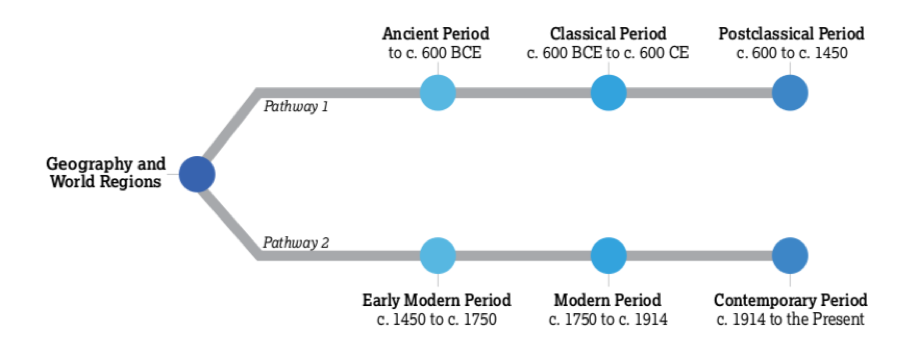Course Overview
Focusing on concepts and skills with maximum value for high school, college, careers, and civic life, Pre-AP World History and Geography is built around three enduring ideas:
- History is an interrelated story of the world.
- History and geography are inherently dynamic.
- Historians and geographers are investigators.
Social Studies Areas of Focus
The areas of focus are reasoning skills that provide vertical alignment within a discipline, giving students the opportunity to develop and strengthen these skills as they progress through subsequent Pre-AP courses and into advanced coursework.
- Evaluating evidence
- Explaining historical and geographic relationships
- Incorporating evidence
Course Resources
Course Content
Before implementing Pre-AP World History and Geography, schools select one of two pathways—allowing them to choose the modules that best fit their state standards and district course sequences. Both pathways begin with the study of geography and world regions.
Each pathway has four main units: geography and three units of history. Review their key topics and the recommended length for each unit:
Pathway 1 focuses on developments in world history from the ancient period through c. 1450 CE.
- Unit 1: Geography and World Regions (~7 weeks)
- Unit 2: The Ancient Period, to c. 600 BCE (~7 weeks)
- Unit 3: The Classical Period, c. 600 BCE to c. 600 CE (~7 weeks)
- Unit 4: The Postclassical Period, c. 600 CE to c. 1450 CE (~7 weeks)
Pathway 2 focuses on developments in world history from c. 1450 CE through the present.
- Unit 1: Geography and World Regions (~7 weeks)
- Unit 2: The Early Modern Period, c. 1450 to c. 1750 (~7 weeks)
- Unit 3: The Modern Period, c. 1750 to c. 1914 (~7 weeks)
- Unit 4: The Modern Period, c. 1914 to the present (~7 weeks)
These themes are interwoven throughout all units:
- Humans and the environment
- Governance
- Economic systems
- Culture
- Society
Each unit contains:
- Source explorations: Sets of curated primary and secondary sources with evidence-based questions and a culminating writing activity.
- Expanding essential knowledge resources: Concise content summaries with graphic organizers to support student exploration.
- In-lesson formative assessments: Short, open-ended problems that highlight the targeted content and skills for each lesson.
- 2 learning checkpoints: These multiple-choice and technology-enhanced questions are modeled closely after the types of questions students encounter on AP Exams and the SAT. Learning checkpoints require students to examine graphs, data, and short texts—often in authentic contexts—to respond to questions that measure students' understanding of the unit’s concepts and skills.
- 1 performance task: A sustained problem-solving task that asks students to synthesize the unit’s skills and concepts while answering questions about a novel context.
Pre-AP Course Audit
Before implementing a Pre-AP course, teachers need to complete Pre-AP Course Audit. This process is required to:
- Grant teachers access to Pre-AP Classroom, including instructional materials, professional learning, and assessment tools
- Authorize the school to use "Pre-AP" in its course names
- Include the school in Pre-AP Course Ledger
